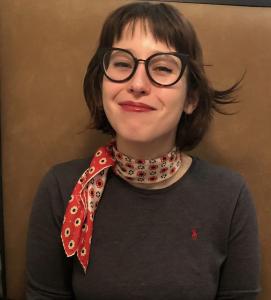Samantha Pellegrino

Contact
Samantha is a PhD student in the Divinity school focusing on Islamic Studies, specifically on the Jâbirian corpus. She received her undergraduate degree from Swarthmore College in 2015.
What does your work focus on / revolve around?
My work focuses on the Jâbirian corpus—the most extensive and influential early-medieval Arabic collection of alchemical works—and the ways in which concepts of artifice, artificiality, and religiosity are theorized in relation to each other. So, I’m particularly interested in parts of these texts where things like technology for the creation of homunculi, or the nature of craftsmanship, or fermentation are discussed. I also take up the historiography of this corpus, which has placed limitations on the methods used in analyzing and interpreting these works.
What is a favorite course you have taken at the Divinity School and what made it a favorite?
‘The Science of the Letters in Judaism and Islam,’ which Professor Robinson taught fairly early into my time here, was one of my favorite courses. The course was an in-depth exploration of the development of the science of the letters, which (to gloss it very briefly) is a cross-cultural medieval system that harnesses the letters of the alphabet in relation to numerology and mysticism for religious, scientific, and occult power. Not only was the material fascinating, but the course brought into sharp relief for me the ways in which studying medieval intellectual traditions can be exciting, enriching, and provocative. We had such good conversations in that class. It was also where I first encountered the texts upon which my dissertation is now based!
What is an aspect of life at the Divinity School or in Hyde Park that you enjoy?
Workshops have been one of the most collaborative and constructive facets of my degree. The experience of sharing papers in progress with my colleagues and receiving generous, interdisciplinary feedback has been of the utmost importance for the development and growth of my thinking and writing. I also feel that the experience of reading work from my colleagues outside of my usual area of study and providing them with feedback has furnished me further with valuable skills and insights, both social and intellectual. Most of all, though, workshops are one of the places where I feel most in community with my peers and where I’ve been able to foster relationships that have made the process of a PhD far richer and less lonely than it could have been.

